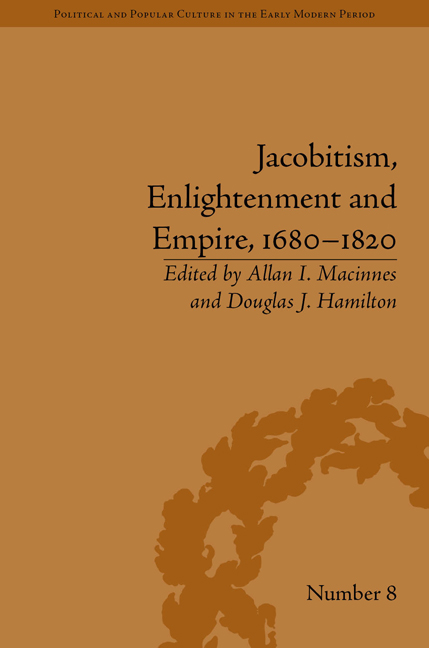Book contents
- Frontmatter
- CONTENTS
- List of Contributors
- List of Tables
- Introduction: Identity, Mobility and Competing Patriotisms
- 1 Jamie the Soldier and the Jacobite Military Threat, 1706–27
- 2 Simply a Jacobite Heroine? The Life Experience of Margaret, Lady Nairne (1673–1747)
- 3 Missionaries or Soldiers for the Jacobite Cause? The Conflict of Loyalties for Scottish Catholic Clergy
- 4 English Liturgy and Scottish Identity: The Case of James Greenshields
- 5 ‘Let Him be an Englishman’: Irish and Scottish Clergy in the Caribbean Church of England, 1610–1720
- 6 Scotland, the Dutch Republic and the Union: Commerce and Cosmopolitanism
- 7 Clearing the Smokescreen of Early Scottish Mercantile Identity: From Leeward Sugar Plantations to Scottish Country Estates c. 1680–1730
- 8 Union, Empire and Global Adventuring with a Jacobite Twist
- 9 John Drummond of Quarrel: East India Patronage and Jacobite Assimilation, 1720–80
- 10 William Playfair (1759–1823), Scottish Enlightenment from Below?
- 11 The Visionary Voyages of Robert Burns
- 12 ‘Defending the Colonies against Malicious Attacks of Philanthropy’: Scottish Campaigns against the Abolitions of the Slave Trade and Slavery
- Abbreviations
- Notes
- Index
5 - ‘Let Him be an Englishman’: Irish and Scottish Clergy in the Caribbean Church of England, 1610–1720
- Frontmatter
- CONTENTS
- List of Contributors
- List of Tables
- Introduction: Identity, Mobility and Competing Patriotisms
- 1 Jamie the Soldier and the Jacobite Military Threat, 1706–27
- 2 Simply a Jacobite Heroine? The Life Experience of Margaret, Lady Nairne (1673–1747)
- 3 Missionaries or Soldiers for the Jacobite Cause? The Conflict of Loyalties for Scottish Catholic Clergy
- 4 English Liturgy and Scottish Identity: The Case of James Greenshields
- 5 ‘Let Him be an Englishman’: Irish and Scottish Clergy in the Caribbean Church of England, 1610–1720
- 6 Scotland, the Dutch Republic and the Union: Commerce and Cosmopolitanism
- 7 Clearing the Smokescreen of Early Scottish Mercantile Identity: From Leeward Sugar Plantations to Scottish Country Estates c. 1680–1730
- 8 Union, Empire and Global Adventuring with a Jacobite Twist
- 9 John Drummond of Quarrel: East India Patronage and Jacobite Assimilation, 1720–80
- 10 William Playfair (1759–1823), Scottish Enlightenment from Below?
- 11 The Visionary Voyages of Robert Burns
- 12 ‘Defending the Colonies against Malicious Attacks of Philanthropy’: Scottish Campaigns against the Abolitions of the Slave Trade and Slavery
- Abbreviations
- Notes
- Index
Summary
The Rev. James Field did not relish his time in Antigua: ‘West India Apostles, of all others, most miserable’. Since 1693 he had pursued the well-worn path from army/navy chaplaincy to various parishes. He felt entitled to a benefice in England; at least a West India regimental chaplaincy to which he could depute a curate. For
had I been a Missionary from any of ye Roman Catholick orders, nay from any of our vile Sectaryes so long a time, I should meet wth some sort of thanks; And yt ye Church of Engld alone should neglect or despise its Propagators is truly strange, but sadly true.
Field would ‘readily sacrifice [his] life for ye Church of Engld’. Given the ill-health that attended tropical service, maybe he did – he died in 1728 – but despite his disillusion he painted a not unattractive picture of what an Anglican servant in the West Indies might expect:
His Duty is only to preach on Sundays, & read ye Prayers & Chatechize ye children in ye afternoone. He will have ye best conversation ye Leeward Isles afford, of Gent, Drs Lawyers, Merchts in St John's.
If he is a single man, his dyet (living in or by ye town) will cost him little or nothing. For besides christening & wedding dinners, he will have a genl invitation of ye Merchts to dine wth ym whenever he pleases.
That is, with one despairing wail: ‘But Dear Dr if possible let him be an Englishman’.
- Type
- Chapter
- Information
- Jacobitism, Enlightenment and Empire, 1680–1820 , pp. 75 - 92Publisher: Pickering & ChattoFirst published in: 2014



